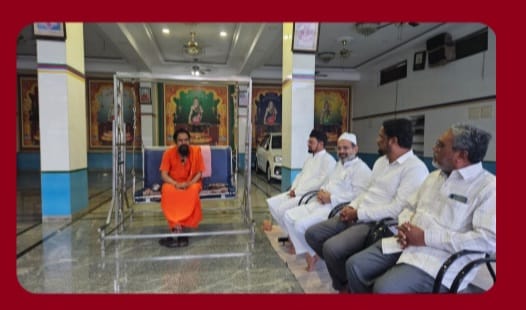– Muhammad Abdullah Javed
Recently, during the festive occasion of Eid al-Fitr, a delegation had the privilege of meeting Swami Ji of Raichur’s Qille Math. This gathering was graced by the presence of Mr. Muhammad Asimuddin Akhtar, Mr. Abdul Samad Pasha, and Mr. Muhammad Salim as well as this writer. Swami Ji welcomed this meeting with joy, and what started as an informal conversation evolved into a profound discussion touching upon critical issues affecting our society.
Addressing Environmental Concerns
One of the key topics that emerged from the dialogue was the pressing issue of environmental challenges, particularly the hardships inflicted by intense heat and water scarcity. Swami Ji eloquently highlighted how our current lifestyle choices significantly impact future generations. Unlike our ancestors’ times, who did not face such extreme weather conditions or water shortages, today’s communities suffer greatly from environmental strains.
To address these challenges effectively, Swami Ji emphasized the urgent need to adopt sustainable lifestyles. This involves critically assessing construction practices and other human activities that contribute to environmental degradation. He stressed the importance of afforestation and responsible water management as practical measures to mitigate these issues.
Reflections on Governance and Accountability
The conversation also delved into the realm of governance practices and societal structures. Swami Ji shared profound insights through Kannada couplets, emphasizing the necessity of accountability in leadership. His words echoed the timeless wisdom that unchecked power inevitably leads to tyranny and oppression.
Drawing from philosophical and spiritual references, Swami Ji underscored the importance of having an oversight mechanism in governance. He referenced verses from both the Kannada couplets and the Quran, highlighting the concept of being accountable to a higher authority. This principle, he explained, fosters a healthy and balanced approach to leadership and societal organization.
Lessons from Divine Guidance
The meeting concluded with reflections on divine guidance and the importance of recognizing a higher authority. Swami Ji emphasized that acknowledging accountability to a greater being fosters humility and ethical behavior among leaders and individuals alike.
By citing verses from sacred texts, Swami Ji conveyed the profound message that genuine leadership involves humility and adherence to higher moral standards. He warned against historical examples where absolute power corrupted leaders, emphasizing the need for humility and accountability in governance.
A Call to Action
The insights shared by Swami Ji during this meeting serve as a compelling call to action. They urge us to prioritize sustainability in our daily lives and advocate for responsible governance structures that promote accountability and ethical leadership.
As we reflect on these discussions, let us heed the wisdom of acknowledging higher authorities, both divine and ethical. By doing so, we can pave the way for a more sustainable and just society, where the well-being of future generations is safeguarded through conscientious action and thoughtful governance.
The meeting with Swami Ji stands as a testament to the power of dialogue and shared wisdom in addressing complex societal challenges. It underscores the importance of collaborative efforts towards a more sustainable and accountable future.
[The writer is Director, ITQAN]




